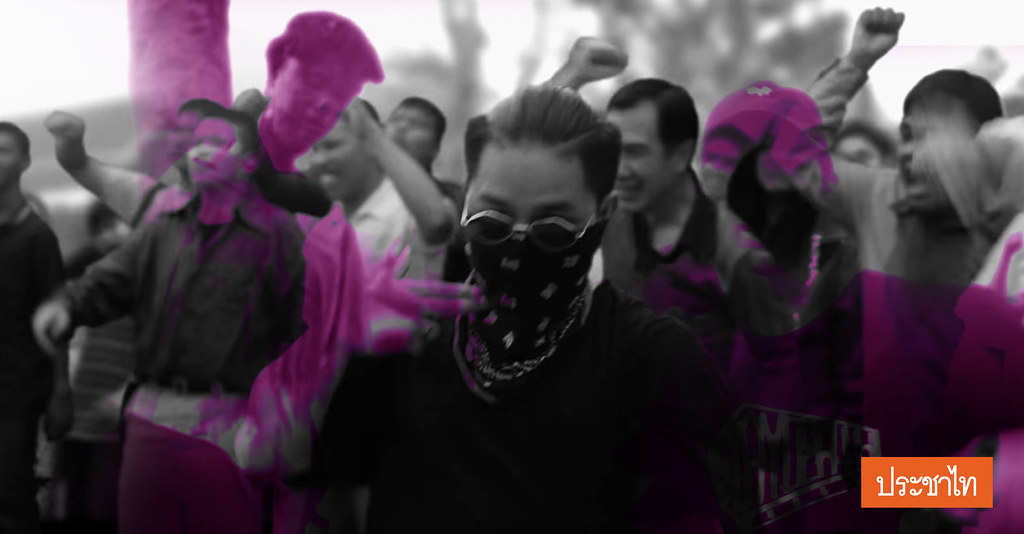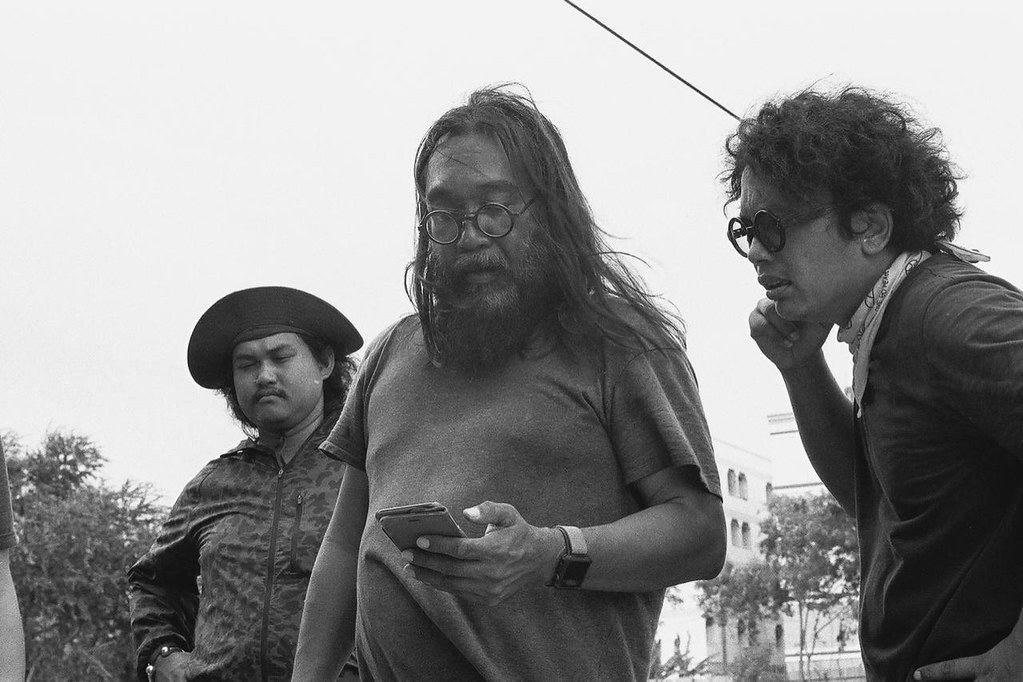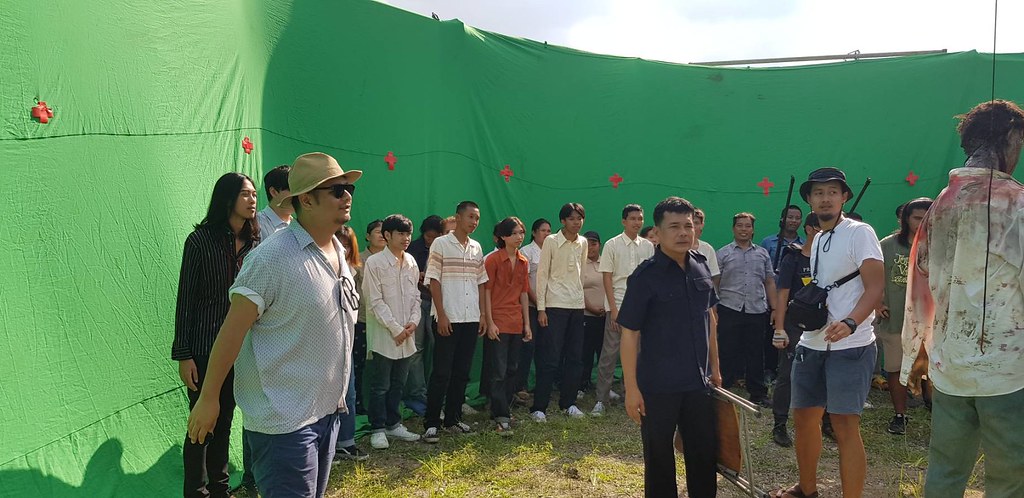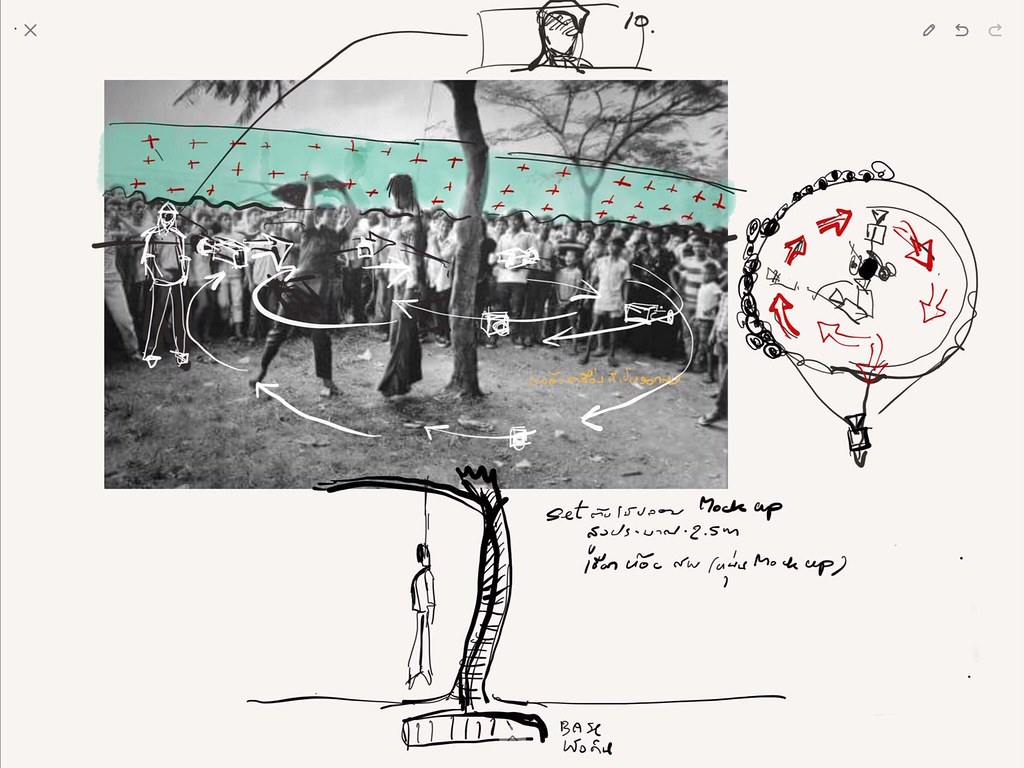‘Rap Against Dictatorship’ says that politics, for them, is posing questions about the things happening in daily life. An interest in politics is a way to change for the better things that you don’t like and dictatorship isn’t only the military, but the election that’s about to happen can also be held in a dictatorial way. We also a talk with Teerawat Rujintham, the director of the MV, who is behind many pro-democracy groups.

After the release of a music video of the rap song ‘Prathet Ku Mi’ (Which is My Country) by the rapper group ‘Rap Against Dictatorship’, YouTube views rocketed past 600,000 within 2 days. The song takes political situations and arranges them in a way that is easy to understand, immediately arousing empathy among listeners. The music video shows one of the memorable photos of 6 October 1976 taken by Neal Ulevich, of a man taking a chair to hit a corpse hanging from a tree; a crowd watches, one boy with a smile on his face. This photo received the Pulitzer Award in 1977 and is used as a background in the last part of the video.
Prachatai interviewed a representative of Rap Against Dictatorship about how the basic idea of the project started, how they composed the song, and about the meaning of politics. They said that to them politics is asking questions about things happening in daily life. An interest in politics is a way to change things you don’t like for the better. Also the meaning of dictatorship covers not only military dictatorship but also the upcoming election which is still going to be done in a dictatorial manner.
We also interviewed Teerawat Rujintham, one of Thailand’s leading cinematographers, who directed this video. He was the one who proposed using the images of 6 Oct as a background. For him, this is the first time that he has revealed his real name after working behind the scenes for many pro-democracy groups, such as Resistant Citizen. Now it’s Rap Against Dictatorship, and he’s ready to answer the question “Are the images that clearly show a corpse and chair-hitting near the end of the music video a reproduction of violence?”
RAD’s Starting Point
The Prathet Ku Mi song has an intro by Liberate P, released since 2016. At that time, he started to compose the political songs Oc(t)ygen, Capitalism, Prathet Ku Mai Mi (Which Is Not My Country) and Prathet Ku Mi as an 8-bar intro. The musical steps hadn’t fallen into place yet, so the project was put on hold.
Near the end of 2017 there were talks between the 4 of us; Liberate P, Jacoboi, ET and Hockhacker about the Rap Against Dictatorship project. We then invited other interested parties to collaborate. However, it is mainly the 4 of us that control the ideas, the song’s direction and promotional methods.
The singers have a common position, which is anti-dictatorship, but may hve different ideas about other things. Was there any conflict when you were working together?
There weren’t any conflicts, since we all already knew that each of us have different approaches. But before we started to make the song, we had an internal workshop. All the rappers talked to each other and discussed what they each wanted to talk about, the method and all the content, as a way of adjusting everyone’s basis in understanding politics of each person which may not be the same. In the group there are people who understand politics very deeply, right to the structure of it, as well as people who are dissatisfied with the current situation but still haven’t looked as deep as the structural issues. After talking about it, people understood more. After the workshop we let them decide whether to participate or not. In the end, everyone decided to do it, just that the content of the song differs depending on the person’s interests.
What audience is the content intended for?
The general public. But how much the content will impress different groups depends on the listeners. We had intended to create a mainstream song. Maybe it’s not that mainstream, but we made a song with content that general people without any basic politics could listen to and get it without having to interpret it, or we didn’t use comparisons since it’d be hard to understand. The song then came out with content that people would feel, “yeah, this is the thing, this is the thing”. It can make them feel dissatisfied. We’ve done a fair amount of of homework on whether the content is too deep, too difficult, too many comparisons, what makes people who listen be with us;. We would then choose that. And our purpose doesn’t want to attack people or criticise them for not protesting, but we’re attacking the state, attacking dictatorship.
This means even though the team discussed things deeply as far as structural problems, when you made the actual song, you didn’t intend it to be that deep, but rather easier to listen to?
Yes, but we also secretly included something that people who have a deep understanding may be able to catch. Since some things we do know, but we really can’t talk about them, or if we don’t need to say something in this song we won’t say it. If we listen to the content in the song, they will see that it is not the same depth.
When composing this song, did you crystallise your thoughts first or was it putting into the song things people in society have already been criticizing ?
Personally, if it’s a party song or regular song about presenting oneself, it wouldn’t be so hard, since it’s something we feel and can express straight away. But if it’s a song about social and political ideologies, there needs to be some crystallisation or understanding of the topic at a certain level. We did quite a lot of homework. Some spent more time on their lyrics than others, some were able to compose them straight away from what they had experienced, because the foundation of perceptions and political experience of each person are different.
Actually it’s something everyone already knows. Like one of the verses that says “the end of the barrel pointing at [the end of] our Adam’s apple” (plai krabok cho thi plai kradueak). It’s a play on words in rap song language. A symbol was hidden there; the end of the barrel means a gun and the Adam’s apple is our chin or mouth. It’s a way to say that we’re in an era where the governing system has guns. It’s something common that everyone knows, but the rappers’ choice of words raised the power of the song. The importance is that what everyone has narrated is what they really feel, and they really do believe in opposing dictatorship, so there is a lot more power. This is a good thing about rap songs; if we talk about something we really have experienced, a lot more power will be sent out.
What is the politics that your group has experienced?
For us politics is posing questions about things that happen in in daily life. Why is it like this? Why can’t we solve these problems? Then at the end it comes back to politics. All power comes from politics. If we don’t care about politics, we won’t be able to change anything. An interest in politics is looking for a way to change things we don’t like for the better. For example, we don’t like traffic jams. If we’re not interested in politics, we may say that the traffic jams are caused by police turning on the traffic lights but if we look at it more deeply, it’s because of national city planning. It depends on how you think of the problem you are faced with. You can just complain or try to find solutions to improve them for the better.
Politics is all around us. Why is it that for the 20 years we’ve walked on the footpath by the road, it has never improved? The bricks on the footpath are still broken. It’s all about administering and managing the city. Politics isn’t only about coming out to protest on the streets or dividing into sides or colours . It’s about livelihoods, what we’re experiencing. It’s not only politicians. In schools, agencies, companies, there are also internal politics. Everyone already knows this. Approaching someone else for certain benefits is politics.
But in the end when you start to look at problems from things near us, the answer leads to political structural issues anyway.
Yes. Our common ground is opposition to dictatorship. It doesn’t only refer to military dictatorship since the military is the most obvious for using power, weapons and fear to interfere with normal people’s lives. But we still have dictatorship in local administration, dictatorship in parliament. People in parliament are all on the same side; there isn’t any opposition.
There are people who see politics as something boring and that whether the government is elected or a dictatorship, life is no better than before. Do you think that your song will communicate with them?
In our group, we believe that we can communicate and inform them, but we don’t expect that you’ll listen to this song and change your behaviour,. because it takes time to believe in something and change behaviour. But we let many people know and when it becomes a trend it’ll open their ideas, that we can talk about these things. People who have listened to the song and commented or shared, we already think that’s awareness. Or if they’re bored and not interested, then that’s their right, because they may have experienced something that makes them doesn’t want to be involved. But some people who live in fear or do not have the courage, come out to criticise us for making this song. We also consider them as already being politically aware, since at least they stood up to express their opinions about this. This is already an ideological movement in this age.
Your feelings when composing this song were anger, refusal to submit?
Everyone feels anger and boredom already, but how will we transfer these feelings into musical aesthetics, so that people would feel what we feel. I think it’s a contemporary song that allows the new generation to listen and feel moved with the content. For us the new generation doesn’t refer to age, but refers to people who are living in the current era, in the current era that has changed. How we understand things better, how much we can keep up with the things that are happening, how do we adapt to the changes in this era; that’s the new generation.
If there’s an election, will RAD continue? Or while waiting for an election, will there be anything else other than criticising dictatorship?
An election may mean democracy, but actually in this election, we know from the news, such as the nominated Senators being appointed, that is still a form of dictatorship. In fact there will be other songs that will be released and after this if there is an election, we’ll talk to each other again about what form the group will take in the future.
000000

Teerawat Rujintham (centre)
How did the idea of Oct 6th in the MV come about?
The idea of Oct 6th came from my curiosity. The first film I produced was The Moonhunter; in the script there is a scene about Oct 6th. There were preparations about how we would film this scene, but in the end the director Bhandit (Rittakol) decided to cut it because he didn’t know how to present it. At that time he said that if it wasn’t presented well, it would turn into exposing a corpse. I didn’t really understand his reason at that time.
Last year I had a chance to help in the Documentation of Oct 6 Project, helping to direct a short film, ‘The Two Brothers’. I read more information about the Oct 6th incident. Recently they wanted me to help find the place where the tree was where the corpse had been hanged . During that time, the idea of contributing to this song came up. I thought about this, mixing them together, and eventually it came out as the scene where the corpse is hanging from the tree with a crowd cheering for the mutilation of the corpse. Normally we only look at photos, but if we place the camera in the middle of the event, the audience will feel something. I think that Oct 6th is a physical symptom of this country’s illness that is still relevant.
The idea of the camera is that I wanted to do a long take with the rappers swapping in for each verse, walking around in a circle. I thought that designing a camera path that goes around in circles stands for Thailand’s situation that’s going nowhere but around in circles. People don’t learn, those with power don’t learn and so history repeats itself. This is a concept only for the producers; the audience doesn’t need to understand it.
With a length of 5 minutes, I had to design it so that it started with a rapper rapping, with people clapping as a background, without knowing what they are clapping about. Maybe they’re just having fun with the singers that are singing, but in the end when we see the Chair Man who’s using a chair to hit the corpse, the audience would understand what event it is and it becomes a highlight at the end.

Behind the scenes of the MV
The photo of the corpse and chair hitting is clear at the end. Is it a reproduction of violence?
This is a topic I’ve been debating with myself. I told my friend who’s a researcher in the Documentation of Oct 6 Project of this concept, and asked what he thought if we used photos of violence from Oct 6th . Would it be like we’re using the photo to rape the audience again? He said sometimes the photos of violent events can’t be denied. For example, two years ago I only just found out that it wasn’t just 2 people that got hanged on Oct 6th but at least 5, some we don’t even know the names of.
We were surprised that something like this has been overlooked for over 40 years. From listening to various people, people in that era thought that they were photos of violence and cruelty and didn’t have the courage to look at them directly. I understand that this lack of courage to look at them directly creates misunderstandings. Another example is that people think that the photo of a person being hanged and hit with a chair is of Wichitchai Amornkul, but we actually don’t know his name. Wichitchai was hanged in a different photo.
The point is that sometimes we have to stare directly at what is happening in front of our faces. That’s why I feel, after weighing it up, the issue of reproducing violence was pushed aside. Sometimes we also have to present violence using a straightforward method, so that people will feel and see certain truths.

Behind the scenes of the filming
Lastly, would you like to leave a few words?
I would like to thank all my friends and others that have helped in this project. Some people would like to remain anonymous. Without them, this MV wouldn’t have been born.
Normally I work as a part of the entertainment industry, but after the coloured shirts, I have always worked behind the scenes. I was behind Resistant Citizen which I’ve always kept a secret. This time I’ve decided to reveal my real name because today many of my fears have disappeared. I feel that if you do something secretly even though you have the same thoughts or ideas for the people, democracy should be the solution for this country. I don’t have anything I need to fear anymore, so I would like to call for other artists have the courage to step out. Society that lives under fear and self-censorship doesn’t work. If we believe in something, we must be brave enough to fight and take a stand for it.
Rap Against Dictatorship is still open for the general public to participate in their activity for 8 bars per person for Prathet Ku Mi. Most recently there have been so many participants it’s become impossible to see with our eyes alone.
Since 2007, Prachatai English has been covering underreported issues in Thailand, especially about democratization and human rights, despite the risk and pressure from the law and the authorities. However, with only 2 full-time reporters and increasing annual operating costs, keeping our work going is a challenge. Your support will ensure we stay a professional media source and be able to expand our team to meet the challenges and deliver timely and in-depth reporting.
• Simple steps to support Prachatai English
1. Bank transfer to account “โครงการหนังสือพิมพ์อินเทอร์เน็ต ประชาไท” or “Prachatai Online Newspaper” 091-0-21689-4, Krungthai Bank
2. Or, Transfer money via Paypal, to e-mail address: [email protected], please leave a comment on the transaction as “For Prachatai English”
